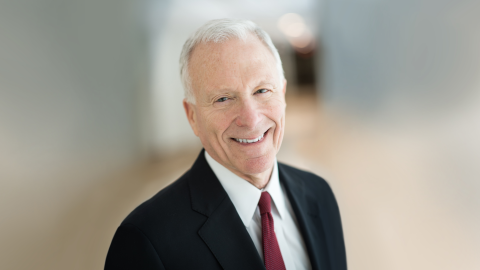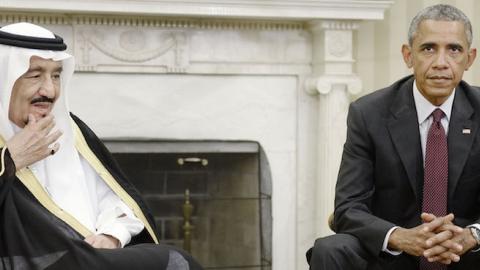‘Obama’s lean years are over and we are now witnessing a new chapter which we hope will be an alternative to the mistakes of the abysmal past.” A Trump supporter’s postelection boast? Hardly. It’s how Turki Aldakhil, a Saudi broadcaster who is general manager of the Al Arabiya news service, greeted President-elect Trump in a recent article.
Some American observers fear that Mr. Trump’s comments on the alleged danger from Muslim immigrants cripple his prospects for effective diplomacy in the Middle East. But at the mid-November Abu Dhabi Strategic Debate, held by the Emirates Policy Center and the Atlantic Council, Mr. Aldakhil and most Arab and Muslim participants were upbeat about the change in U.S. leadership.
Many principal speakers, including Ebtesam Al-Ketbi, the chairwoman of the conference, and Sheikh Mohammad Al-Sabah, the former foreign minister of Kuwait, as well as speakers from the floor, returned again and again to the threat Iran had become and the failure of President Obama’s policies to deal with this threat. They professed to be intrigued by Mr. Trump’s statements that seemed “very different” and promisingly so.
Summing this all up, Mr. Aldakhil wrote in the Saudi daily Okaz on Nov. 13, “No one will weep” for Mr. Obama’s departure. The president “brought our region nothing but hesitance toward the Iranian axis, while flirting with and rewarding it, and strictness toward the Gulf axis, while evading agreements.” He was referring to security-related guarantees and promises made by Mr. Obama at Camp David in May 2015 to calm Arab fears about the Iranian nuclear deal.
Mr. Trump’s continued welcome depends on fulfilling two Arab hopes. First, that he will reverse Mr. Obama’s disengagement from the region. The other hope is that the next president will embrace his country’s historic reliability by distinguishing between America’s enemies and its friends, and by marshaling joint efforts to serve joint interests.
Mr. Obama leaves the region with multiple and worsening challenges, not only the incomplete war against Islamic State. The Obama legacy includes an empowered Iran that threatens American interests, destabilizes the Sunni world, and violates agreements on missiles and nuclear development. Multiple, heavily sectarian Sunni-Shiite civil wars rage.
Iraq, which the Obama administration claimed as a triumph, writhes in domestic strife under a heavy Iranian hand. Prospects for more moderate Syrian opposition forces, once promising, have plummeted due to years of attrition and Western neglect during an unrelenting Iranian-backed assault on opponents of Bashar Assad’s Syrian regime.
Meanwhile—as noted by Ali Al Noemi, who attended the Abu Dhabi conference as secretary-general of the United Arab Emirates’ Council of Muslim Elders—growing Sunni Islamist extremism, including the Muslim Brotherhood, endangers regional stability. Turkey, a supposed ally but strongly influenced by its own version of the Brotherhood, proves unreliable in good will and capacity.
Hovering over these difficulties are complicating factors. Efforts to defeat one of our adversaries may advance the interests of another. Russia’s massive intervention in the region in pursuit of its economic and geopolitical interests challenges U.S. influence. America’s traditional regional allies also face daunting internal troubles, even as they question Washington’s reliability as a partner.
Small wonder, then, that they look hopefully to statements by Mr. Trump and his nominated secretary of defense, Gen. Jim Mattis, and national security adviser, Gen. Mike Flynn. While candidate Trump emphasized crushing ISIS and tearing up the Iranian nuclear agreement, Messrs. Mattis and Flynn also struck welcome notes to Arab ears.
Gen. Mattis, speaking at a conference on April 21, described the Iranian regime as “the single most enduring threat to stability and peace in the Middle East.” In his June 10, 2015 congressional testimony, Gen. Flynn decried what he called Iran’s “negative behavior and expanding influence.” To resist ISIS and Iranian aggressions, Gen. Flynn testified in favor of greater U.S. engagement, including organizing and arming Arab forces “able to secure their regional responsibilities”.
Statements like these may be one reason Arabs critical of Mr. Obama’s “abysmal past” and pro-Iranian tilt, now see hope that America will recognize common threats and lead others to counter them. They look to hardheaded American interests to outweigh, not disregard, cultural and political differences.
In this respect, President Trump will also face a dilemma not unlike one that Reagan’s first U.N. ambassador, Jeanne Kirkpatrick, identified during the Cold War. To confront worse enemies, America must work with countries that do not share, and sometimes violate, our values. Ultimately, she believed, this will serve security and freedom.
As Gen. Mattis said last spring—while recognizing concerns about Islamic State and al Qaeda—“Nothing, I believe, is as serious in the long term in enduring ramifications, in terms of stability and prosperity, and some hope for a better future for the young people out there, than Iran.” If the Trump administration actively holds to these goals and priorities, the Arab world’s welcome will endure.

















